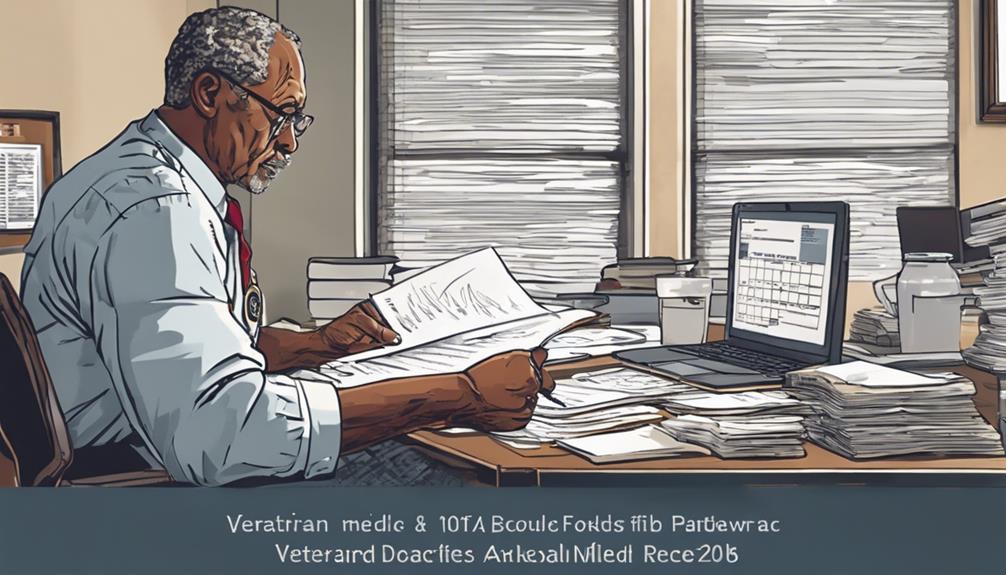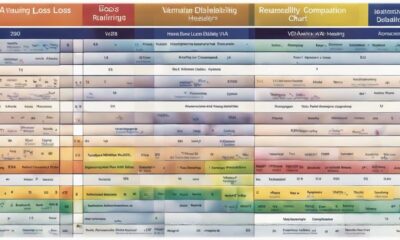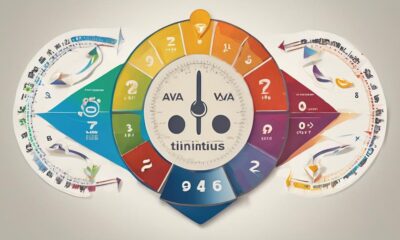Tinnitus
Top 10 FAQs About Tinnitus and Hearing Loss VA Disability Rating
Hearing ringing in your ears? Learn how tinnitus and hearing loss affect your VA disability rating in the top 10 FAQs.

Consider a former military service member who has been in combat and now suffers from a constant buzzing in their ears along with struggles to follow along in conversations. This individual may be curious about how tinnitus and hearing loss could affect their VA disability score.
Understanding how these conditions are evaluated can be crucial for veterans seeking support. By exploring the top 10 FAQs surrounding tinnitus and hearing loss VA disability rating, individuals can gain insight into the process and make informed decisions about their benefits.
Key Takeaways
- Establishing service connection is crucial for VA disability benefits.
- Detailed evidence and documentation are essential for successful claims.
- Understanding secondary service connection criteria is vital.
- Treatment options for hearing loss include hearing aids and implants.
Causes of Tinnitus and Hearing Loss
Exposure to loud noises, such as gunfire and explosions, commonly causes tinnitus and hearing loss in veterans. The improper use of protective gear, like the defective 3M earplugs, can exacerbate these issues. Furthermore, veterans exposed to jet fuel during their service may experience auditory complications, including tinnitus and hearing loss. Combat-related blast injuries pose a significant risk as they can lead to inner ear damage, resulting in persistent tinnitus and varying degrees of hearing loss. Additionally, traumatic brain injuries (TBI) significantly heighten the likelihood of developing hearing problems, such as tinnitus and impaired hearing.
Understanding the various factors that contribute to tinnitus and hearing loss in veterans is crucial for providing them with the necessary support and care. By recognizing the impact of exposure to loud noises, defective protective equipment, jet fuel, blast injuries, and TBIs, healthcare providers can better address the unique needs of these individuals. It's essential to prioritize early detection and intervention to mitigate the long-term effects of these auditory challenges on veterans' quality of life.
Establishing Service Connection for Disability

When establishing service connection for disability, veterans need to meet specific criteria and provide compelling evidence and documentation. This includes:
- Records of noise exposure during service.
- Documented complaints of hearing issues.
- Medical records confirming diagnosis and treatment.
Supportive statements from service members or family members can also strengthen the claim for service connection.
Service Connection Criteria
Establishing service connection for disability related to tinnitus or hearing loss in veterans necessitates demonstrating a current diagnosis along with a clear linkage to military service through medical and service records. The criteria for proving service connection involve showing the onset of symptoms or diagnosis during military service or as a result of military-related activities. Below is a table summarizing key points related to service connection criteria:
| Criteria | Description | Importance |
|---|---|---|
| Current Diagnosis | Present diagnosis of tinnitus or hearing loss supported by medical evidence | Essential for VA disability benefits |
| Nexus | Linkage between current disability and military service through documented evidence | Crucial for establishing service connection |
| Exposure to Loud Noises | Evidence of exposure to high levels of noise during military service | Supports the claim of disability |
| Lay Evidence | Testimonials from the veteran or fellow service members corroborating the connection to military service | Strengthens the case for service connection |
| Military Service | Detailed records of the veteran's service history and duties to establish the connection to the disability | Fundamental for the disability claim |
Evidence and Documentation
To effectively establish service connection for disability related to tinnitus or hearing loss in veterans, comprehensive evidence and documentation are crucial components of a successful VA disability claim. Veterans must provide proof of in-service noise exposure, like combat records or exposure to occupational hazards, to link their condition to military service. Medical records indicating a current diagnosis of tinnitus or hearing loss, along with a medical nexus connecting the condition to military service, are vital for a successful claim.
Lay evidence from the veteran or fellow service members can strengthen the connection between the onset of tinnitus or hearing loss and specific events during military service. Detailed documentation, including audiologist test results, medical opinions, and service treatment records, is necessary to support the service connection in VA disability claims for tinnitus and hearing loss.
Secondary Service Connection Explained
When considering Secondary Service Connection, veterans must understand the basics of linking their tinnitus or hearing loss to a primary service-connected condition. Establishing this connection requires presenting compelling evidence and a clear nexus between the primary and secondary issues.
This process can significantly impact disability benefits for veterans with interconnected conditions.
Secondary Connection Basics
In understanding the basics of secondary connection for VA disability claims, veterans can effectively link tinnitus or hearing loss to a primary service-connected condition. Here are key points to grasp:
- Direct Relationship: Veterans establish secondary connection by proving a direct link between the primary and secondary conditions.
- Examples: Instances include linking tinnitus from blast exposure to a service-connected traumatic brain injury.
- Claim Strength: Secondary service connection strengthens VA disability claims by broadening compensable conditions.
- Maximizing Benefits: Understanding the criteria for secondary connection is vital for veterans to maximize disability benefits.
Evidence and Nexus
We rely on compelling evidence and a strong nexus to establish secondary service connection between a current condition like tinnitus and a service-connected disability. Medical opinions, treatment records, and expert reports play crucial roles in strengthening the link between the primary and secondary conditions.
It's essential to demonstrate how the service-connected disability contributes to the development or worsening of tinnitus to establish secondary service connection successfully. The nexus between the primary and secondary conditions must be supported by robust medical evidence, showcasing the relationship between them.
Veterans who can prove secondary service connection may be eligible for additional disability benefits related to tinnitus resulting from their service-connected disabilities.
Understanding VA Disability Ratings

Understanding VA Disability Ratings reveals the specific criteria used by the VA to assess tinnitus and hearing loss for disability compensation. Here are key points to help grasp the VA's approach to disability ratings:
- Different Rating Systems: Tinnitus falls under Diagnostic Code 6260 while hearing loss is rated under CFR Title 38, Part 4, Schedule for Rating Disabilities, DC 6100.
- Potential Ratings: Tinnitus can receive a 10% rating according to VA disability guidelines, with hearing loss ratings ranging from 0% to 100% based on specific tests.
- Separate Conditions: The VA considers hearing loss and tinnitus as distinct conditions for disability rating purposes, each evaluated based on its individual impact.
- Detailed Assessment: Disability ratings are determined through a comprehensive evaluation process that considers the severity and functional impairment caused by hearing loss or tinnitus to establish an appropriate level of compensation.
Reasons for Claim Denials

Transitioning from the topic of Understanding VA Disability Ratings, it's crucial to address the common reasons for claim denials related to tinnitus and hearing loss VA disability benefits.
Claim denials often occur due to a lack of evidence linking tinnitus or hearing loss to military service. Inadequate medical documentation or diagnosis of these conditions can also lead to denials. Establishing a clear nexus between military service and the onset of tinnitus or hearing loss is vital; failure to do so may result in claim denials.
Furthermore, insufficient proof of the severity of these conditions impacting daily life activities can be a reason for denial. Inconsistencies found in medical records, service records, or lay statements can also contribute to the denial of claims for tinnitus and hearing loss VA disability benefits.
It's imperative to ensure that all necessary documentation and evidence are provided to support the claim and establish eligibility for benefits.
Veterans' Eligibility for Benefits

When assessing veterans' eligibility for benefits related to hearing loss or tinnitus, establishing a clear link to military service is essential. Here are key points to consider:
- Service Connection: Veterans must prove a direct link between their hearing loss or tinnitus and their time in the military to qualify for VA disability benefits.
- Evidence Requirement: Providing documented evidence of the diagnosis and the connection to military service is crucial for a successful benefits claim.
- Compensation and Healthcare Benefits: Veterans with service-related hearing loss or tinnitus may be entitled to compensation for their condition and access to healthcare benefits through the VA.
- Numbers Matter: In the fiscal year 2020 alone, over 1.3 million veterans received disability benefits for hearing loss, highlighting the significance of these claims.
Ensuring all necessary documentation and proof are in order is fundamental in securing the benefits and support that veterans deserve for their service-related hearing impairments.
Hearing Loss Treatment Options

To effectively address hearing loss, a range of treatment options are available, each tailored to specific needs and conditions. Blockage removal procedures can address physical obstructions in the ear canal, while corticosteroids are prescribed to reduce inflammation and improve hearing function. Hearing aids and cochlear implants are common solutions to amplify sound and enhance hearing in individuals experiencing hearing loss.
Additionally, prescribed medications such as antibiotics for infections or diuretics for fluid-related issues may be recommended based on the specific hearing problem. Seeking guidance from healthcare professionals and audiologists is crucial in exploring and determining the most effective treatment options for hearing loss. These experts can assess the individual's condition, provide personalized recommendations, and offer ongoing support to improve overall hearing health.
Qualifying for Disability Benefits

Establishing a service connection linking their current condition to their time in the military is crucial for veterans seeking to qualify for VA disability benefits for tinnitus and hearing loss. When applying for VA disability benefits based on hearing impairment, several key factors come into play:
- Service Connection for Hearing: Veterans must demonstrate that their hearing loss or tinnitus is connected to their military service to be eligible for VA disability benefits.
- Diagnostic Code: The VA uses specific diagnostic codes to evaluate hearing loss and assign disability ratings, impacting the amount of compensation awarded.
- Threshold Average and Speech Discrimination: The severity of hearing loss is determined through tests measuring the threshold average and percentage of speech discrimination.
- Bilateral Hearing: Veterans with hearing impairment in both ears may receive higher disability ratings due to the impact on overall communication abilities.
Understanding these aspects is crucial for veterans navigating the process of qualifying for VA disability benefits related to tinnitus and hearing loss.
Filing a Disability Claim

How can veterans effectively file a disability claim for tinnitus or hearing loss in order to secure VA disability benefits? When initiating a claim, it's essential to gather evidence such as in-service events, current diagnosis, and a nexus connecting the condition to military service.
Licensed audiometric testing is crucial for diagnosing hearing loss accurately and determining the severity for VA disability benefits eligibility. Furthermore, establishing a service connection for tinnitus and hearing loss claims relies heavily on lay evidence, service records, and comprehensive medical documentation.
Veterans should ensure that they remove hearing aids before audiometric testing to ensure precise results for their disability claim. In cases where a claim for tinnitus or hearing loss is denied, seeking assistance from experienced attorneys, such as those at Chisholm Chisholm & Kilpatrick LTD, can significantly improve the chances of securing the deserved disability benefits.
VA C&P Exam Expectations

During the VA Compensation and Pension (C&P) exam for hearing loss, a state-licensed audiologist will assess your hearing ability through specific tests. Here are some key expectations to keep in mind:
- The audiologist will measure your Speech Discrimination Percentage to evaluate how well you can understand speech in different environments.
- Puretone Threshold Average testing will be conducted to determine the softest sounds you can hear at different frequencies.
- The C&P exam plays a crucial role in assessing the severity of your hearing loss, which directly impacts your VA disability rating.
- Frequencies ranging from 500 Hz to 8,000 Hz will be covered during the Puretone Threshold Testing to provide a comprehensive evaluation of your condition.
Frequently Asked Questions
Can You Get VA Disability for Both Hearing Loss and Tinnitus?
Yes, we can receive VA disability benefits for both hearing loss and tinnitus simultaneously. The VA recognizes these as separate disabilities eligible for compensation.
Veterans often have both due to shared risk factors like noise exposure. Each condition is rated and compensated separately by the VA based on specific criteria and test results.
It's crucial to seek evaluation and documentation for both to maximize disability benefits.
What Can Be Done for Hearing Loss and Tinnitus?
For hearing loss, various treatment options are available, including procedures to remove blockages, corticosteroids for inflammation, hearing aids, cochlear implants, and tailored medications.
Tinnitus management focuses on symptom control since there's no cure. Seeking support from healthcare professionals and VA disability resources is crucial for optimal care and compensation.
Understanding the relationship between hearing loss and tinnitus is essential for comprehensive disability claims and appropriate treatment.
When Does Tinnitus Become Unbearable?
When tinnitus becomes unbearable varies for each individual. It typically reaches that point when it significantly disrupts daily activities or causes severe distress.
This can lead to issues like anxiety, depression, and sleep disturbances. For veterans, unbearable tinnitus may affect concentration, work performance, and social interactions.
Seeking help from professionals like audiologists, ENT specialists, or mental health providers is crucial in managing unbearable tinnitus and improving quality of life.
What Sufferers of Tinnitus Often Also Suffer From?
We often experience hearing loss alongside tinnitus. This condition can bring difficulties like trouble concentrating, sleep disturbances, and increased stress.
Veterans with tinnitus may also face anxiety, depression, and PTSD. The interconnected nature of tinnitus with other health issues can worsen existing mental health challenges, impacting overall quality of life.
When seeking VA disability benefits, addressing these interconnected conditions is crucial for a comprehensive claim.
Conclusion
In conclusion, understanding the process of VA disability ratings for tinnitus and hearing loss is crucial for veterans seeking benefits. By establishing service connection, exploring treatment options, and filing a proper disability claim, veterans can navigate the system more effectively.
Remember, 'knowledge is power' when it comes to advocating for the support and resources you deserve as a veteran dealing with these challenging disabilities.
Tinnitus
How to Manage Mild Hearing Loss and Tinnitus With Hearing Aids
Discover effective strategies for managing mild hearing loss and tinnitus with hearing aids, offering valuable insights for improving your auditory well-being.

In the context of addressing mild hearing loss and tinnitus through the use of hearing aids, the adage ‘an ounce of prevention is worth a pound of cure’ remains applicable. Yet, what is one to do once these issues have already manifested, and the aim is to find effective strategies for dealing with them?
Well, let's explore some insightful strategies that could make a remarkable difference in your auditory well-being.
Key Takeaways
- Hearing aids reduce tinnitus annoyance and enhance hearing clarity.
- Tailored solutions based on individual needs and lifestyle improve management.
- Opt for advanced hearing aids with tinnitus-masking features for optimal results.
- Counseling and personalized fitting optimize tinnitus management with hearing aids.
Understanding Mild Hearing Loss and Tinnitus
Understanding mild hearing loss and tinnitus is crucial for individuals to effectively manage these conditions and improve their quality of life. Mild sensorineural hearing loss (MSNHL) affects a significant portion of the population, with 9-15% of individuals older than 15 years experiencing this condition. Tinnitus, characterized by the perception of sound without an external source, is prevalent in about 10-15% of the U.S. population and often coexists with hearing loss.
For those with MSNHL, seeking appropriate interventions like hearing aids can't only assist in managing hearing loss but also alleviate tinnitus symptoms. Despite the benefits that hearing aids offer in managing tinnitus, only 20% of individuals with sensorineural hearing loss opt for these devices.
Benefits of Using Hearing Aids

To effectively manage mild hearing loss and tinnitus, harnessing the benefits of using hearing aids is a pivotal step towards improving auditory function and quality of life. Hearing aids offer a range of advantages, including providing tinnitus relief by restoring auditory input and enhancing hearing clarity. Studies indicate that approximately 68% of individuals experience a reduction in tinnitus annoyance when using hearing aids, making them particularly effective for those with mild hearing loss. Furthermore, newer hearing aid models come equipped with sound therapy features that can help distract from tinnitus noises and promote relaxation. Collaborating with healthcare professionals allows for the development of personalized treatment plans that incorporate hearing aids, ensuring a tailored approach to managing tinnitus and hearing loss. By embracing the benefits of hearing aids, individuals can significantly improve their auditory experience and overall well-being.
| Benefits of Using Hearing Aids | |
|---|---|
| Tinnitus Relief | Sound Therapy |
| Mild Hearing Loss Management | Personalized Treatment Plans |
Choosing the Right Hearing Aid
Selecting the right hearing aid for managing mild hearing loss and tinnitus involves considering your individual hearing abilities, the severity of your tinnitus, and your lifestyle preferences.
When choosing a hearing aid, it's crucial to evaluate the sound frequencies affected by your tinnitus to ensure the device can effectively address those frequencies. Look for hearing aids with tinnitus-masking features, such as customizable sound therapy, to help distract from tinnitus sounds and provide relief.
Consulting with an audiologist is essential to ensure the hearing aid is tailored to your specific hearing needs and tinnitus symptoms. Opting for prescription hearing aids with advanced sound processing functions can offer better tinnitus relief and overall enhancement of your hearing experience.
Tips for Managing Hearing Difficulties

In managing hearing difficulties, positioning oneself in optimal listening environments can significantly reduce background noise and enhance communication clarity. Informing others about your hearing challenges is essential to foster understanding and facilitate effective communication.
Staying engaged in conversations by providing context can help overcome obstacles posed by mild hearing loss. Utilizing assistive devices such as hearing aids is crucial for amplifying sounds and improving hearing clarity during daily activities.
Consider exploring over-the-counter (OTC) hearing aids that offer features like volume control and compatibility with devices to manage mild hearing loss and tinnitus. These aids can provide tinnitus relief and enhance your overall auditory experience.
Improving Quality of Life With Hearing Aids
Enhancing the quality of life for individuals with mild hearing loss and tinnitus is a primary goal achieved through the effective use of hearing aids. Studies have shown that wearing hearing aids can lead to a significant reduction in tinnitus severity, as assessed by tools like the Tinnitus Handicap Inventory and Visual Analog Scale. Individuals experiencing untreated sensorineural hearing loss and chronic tinnitus can see notable improvements in tinnitus annoyance after six months of wearing hearing aids.
Psychoacoustic measurements, such as changes in tinnitus pitch and loudness, demonstrate the efficacy of hearing aids in managing tinnitus symptoms and enhancing overall well-being. Counseling sessions and personalized fitting of hearing aids are vital components in optimizing tinnitus management strategies. By utilizing these strategies, individuals can experience a substantial improvement in their quality of life, reducing the impact of tinnitus noises and enhancing their overall hearing experience.
Frequently Asked Questions
What Can You Do for a Minor Hearing Loss?
For minor hearing loss, we can explore various solutions. Seeking help from a professional audiologist is crucial. They'll assess your hearing and recommend appropriate interventions.
In some cases, hearing aids may be suggested to amplify sounds and improve communication. It's essential to address minor hearing issues promptly to prevent potential impacts on daily life.
Can Tinnitus Be Treated With Hearing Aids?
Yes, tinnitus can be treated with hearing aids. These devices amplify external sounds, diverting attention from tinnitus noises. By providing relief or reducing noticeability in 68% of cases, hearing aids offer customizable programming to mask tinnitus frequencies and promote relaxation.
Advanced sound processing functions in prescription hearing aids automatically adjust for optimal tinnitus management. Matching the frequency range of tinnitus sounds with the right hearing aids can effectively alleviate tinnitus symptoms.
How Do You Deal With Hearing Loss and Tinnitus?
Dealing with hearing loss and tinnitus can be challenging, but there are effective ways to manage these conditions.
Seeking professional help, such as consulting with audiologists for customized solutions, can greatly improve our quality of life.
Using hearing aids with sound therapy features and AI technology can provide relief by amplifying external sounds and distracting from tinnitus noises.
It's essential to explore options that match our specific needs to enhance our hearing experience.
Do Hearing Aids Help With Mild Hearing Loss?
Yes, hearing aids can greatly assist with mild hearing loss. These devices amplify sounds, enhancing clarity and comprehension. Studies indicate improved speech understanding and overall quality of life for individuals with mild sensorineural hearing loss.
In noisy settings, hearing aids are particularly effective, enabling better engagement in conversations and social interactions. They can also alleviate communication challenges and reduce annoyance from tinnitus.
Conclusion
In conclusion, embracing the benefits of using hearing aids can be a breakthrough in managing mild hearing loss and tinnitus. By choosing the right aid and working closely with healthcare professionals, we can navigate through the challenges and improve our quality of life.
Let's amplify our ability to enjoy sound and silence, and silence the struggles of tinnitus with the power of personalized hearing solutions.
Tinnitus
What VA Disability Benefits Cover Tinnitus and Hearing Loss?
Uncover the hidden truths behind VA Disability Benefits for tinnitus and hearing loss, revealing crucial insights that every veteran needs to know.

The adage goes, “Where there’s smoke, there’s fire,” right? This is particularly true in the context of VA Disability Benefits for tinnitus and hearing loss; there’s certainly more beneath the surface to investigate.
Understanding the intricacies of the application process and the criteria for eligibility is essential, especially when it comes to establishing a service connection. But what exactly do these benefits entail, and how can veterans navigate this complex system to ensure they receive the support they deserve?
Let's unpack the details and shed light on what lies ahead for those seeking assistance with these common service-related ailments.
Key Takeaways
- VA Disability Benefits cover tinnitus and hearing loss related to military service.
- Service connection evidence, medical records, and audiologist tests are crucial for benefits.
- Treatment options include hearing aids, cochlear implants, and corticosteroids.
- Understanding the VA benefits system and seeking guidance can improve benefit approval chances.
Causes of Tinnitus and Hearing Loss
Exposure to loud noises, such as gunfire and aircraft, is a prevalent cause of tinnitus and hearing loss among veterans. The constant barrage of noise in military environments can take a toll on our hearing, leading to long-term issues.
Moreover, the use of defective protective equipment, like the faulty 3M earplugs, has exacerbated auditory problems for many service members. Jet fuel exposure during our time in service is another factor that can contribute to hearing difficulties, including the development of tinnitus.
Additionally, blast injuries sustained during combat situations can result in inner ear damage, which manifests as both tinnitus and hearing loss. Furthermore, traumatic brain injuries that we might've experienced while serving increase the likelihood of developing hearing problems, such as tinnitus and hearing loss.
These various causes underscore the importance of recognizing and addressing the impact of military service on our auditory health.
Establishing Service Connection for Benefits

When establishing a service connection for VA disability benefits related to tinnitus or hearing loss, veterans must provide documented evidence linking their condition to their military service. This involves detailing specific in-service events, such as exposure to loud noises or combat situations, that may have led to the hearing loss. Medical evidence from licensed audiologists diagnosing the hearing conditions is crucial in this process.
Service records, medical records, and testimonies from fellow service members can also provide essential support for proving the connection between military service and tinnitus or hearing loss. The nexus between the current diagnosis of tinnitus or hearing loss, the documented in-service events, and the medical evidence is vital in establishing the service connection for VA disability benefits.
VA Disability Ratings for Tinnitus
Rating tinnitus for VA disability benefits typically falls under 38 CFR § 4.87 at a standard rate of 10%. Achieving a higher disability rating for tinnitus is challenging, with 10% being the most common rating granted.
While it's possible to relieve tinnitus symptoms, veterans rarely receive a disability rating higher than 10% for this condition. Tinnitus is one of the most claimed disabilities for VA compensation, highlighting its prevalence among veterans.
Despite the difficulties in obtaining higher disability ratings, it's essential for veterans experiencing significant tinnitus-related challenges to seek support and explore available resources.
Applying for VA Benefits Process

Understanding the intricacies of the application process for VA benefits related to tinnitus and hearing loss is crucial for veterans seeking compensation. When applying for VA benefits, veterans must establish a service connection, linking their hearing loss or tinnitus to their time in the military. This involves providing evidence of in-service events, a current diagnosis, and a nexus between the condition and military service.
Licensed audiologists conduct specific tests, such as audiometric tests, to diagnose and rate hearing loss and tinnitus accurately for VA benefits. Alongside test results, service records, medical documentation, and lay evidence are vital components of the application process. Meeting the criteria for disability ratings based on these factors is essential to receive compensation for tinnitus and hearing loss from the VA.
Veterans navigating this process may find it challenging, but with proper guidance and the necessary documentation, they can increase their chances of a successful application for VA benefits.
Treatment Options for Hearing Loss
Exploring a range of treatment options can significantly enhance the quality of life for individuals experiencing hearing loss. When addressing hearing loss, various interventions can play a crucial role in improving auditory function and overall well-being:
- Hearing aids: These devices amplify sounds, making them clearer and louder for the individual.
- Cochlear implants: Suitable for severe hearing loss, these electronic devices stimulate the auditory nerve directly.
- Corticosteroids: Prescribed to reduce inflammation in the ear, particularly beneficial for sudden sensorineural hearing loss.
- Auditory training and communication strategies: Rehabilitation programs that focus on improving listening skills and effective communication.
- Blockage removal: Procedures to eliminate physical obstructions in the ear canal, facilitating sound conduction.
In addition to these options, treatments like antibiotics for infections or diuretics for conditions like Meniere's disease can also help manage specific types of hearing loss. By combining medical interventions with auditory rehabilitation, individuals can work towards maximizing their hearing potential and quality of life.
Frequently Asked Questions
Can You Get VA Disability for Both Hearing Loss and Tinnitus?
Yes, we can receive VA disability benefits for both hearing loss and tinnitus if they're service-connected conditions. Tinnitus is usually rated at 10%, while hearing loss ratings vary.
It's common to have both due to shared risk factors. The VA acknowledges their impact and compensates accordingly. To qualify, veterans must establish a service connection and meet specific criteria.
It's crucial to seek support and explore all available benefits.
How Much Compensation Will I Get for Hearing Loss and Tinnitus?
We understand the concern about compensation for hearing loss and tinnitus. The amount of compensation varies based on the severity of the conditions. Mild-to-moderate hearing loss typically receives a 0% or 10% rating, while severe cases may range from 30% to 50%.
Tinnitus is usually rated at 10%. It's essential to seek a thorough evaluation by a VA healthcare provider to determine the appropriate compensation for your specific situation.
What Does 80% VA Disability Entitle You To?
At 80% VA disability, we're entitled to substantial benefits like enhanced healthcare coverage and vocational rehabilitation services.
This level of disability signifies significant impairment, allowing us access to special monthly compensation based on our unique circumstances.
These benefits provide vital support for our overall well-being and can assist us in achieving our career goals.
What Can Be Done for Hearing Loss and Tinnitus?
We understand the challenges of hearing loss and tinnitus. When addressing these issues, it's important to explore various treatments like hearing aids, cochlear implants, and progressive tinnitus management. These options can significantly improve daily life for many.
Seeking help is a crucial step towards better quality of life. Let's continue to support each other in managing these conditions with empathy and understanding.
Conclusion
In conclusion, it's important for veterans to understand the criteria for VA Disability Benefits covering tinnitus and hearing loss.
Did you know that nearly 2.7 million veterans receive disability benefits for hearing loss and tinnitus combined?
By seeking proper diagnosis, establishing service connection, and exploring treatment options, veterans can improve their quality of life and access the benefits they deserve.
Tinnitus
Understanding Hearing Loss and Tinnitus: A Self-Assessment Questionnaire
Delve into your auditory health with our self-assessment questionnaire, unraveling the mysteries of hearing loss and tinnitus for a clearer perspective.

Although the thought of using self-evaluation instruments might feel overwhelming, our survey provides an easy and efficient method for assessing your hearing and tinnitus issues.
As we navigate the intricacies of these common conditions, it becomes crucial to understand how they impact our daily lives.
This questionnaire serves as a starting point, prompting reflection on symptoms and their implications.
By taking this initial step, individuals can gain valuable insights into their auditory health, paving the way for informed decisions and potential solutions.
Key Takeaways
- Self-assessment tools aid in evaluating hearing loss and tinnitus symptoms accurately.
- Tinnitus impacts daily life, requiring effective management strategies.
- Seeking professional help, including audiologists, is crucial for tailored management plans.
- Regular use of self-assessment tools empowers proactive steps for better hearing care.
Importance of Self-Assessment Tools
Utilizing self-assessment tools is essential for individuals to evaluate their symptoms related to hearing loss and tinnitus accurately. These tools serve as a valuable initial step in assessing one's hearing health before seeking professional evaluation. By answering questions about sound perception, hearing difficulties, daily life impact, and family history of hearing issues, individuals can gain insights into potential hearing concerns. A single positive response in a self-assessment questionnaire may indicate the presence of hearing loss or tinnitus, highlighting the importance of further evaluation by a specialist.
Regular use of self-assessment tools enables individuals to monitor changes in their hearing status over time, empowering them to address any emerging issues promptly. These questionnaires offer a convenient and accessible means for individuals to take proactive steps towards better hearing care. By incorporating self-assessment tools into their routine, individuals can stay vigilant about their hearing health and make informed decisions regarding hearing evaluation and management.
Common Signs of Hearing Loss

An understanding of common signs of hearing loss is crucial for recognizing potential auditory challenges early on and seeking appropriate intervention. Here are some key signs to look out for:
- Difficulty understanding speech, especially in noisy environments.
- Asking others to repeat themselves frequently.
- Turning up the volume on electronic devices beyond what others find comfortable.
- Experiencing ringing in the ears, known as tinnitus.
These signs can manifest gradually, leading to missed sounds like doorbells or alarms, or suddenly after exposure to loud noises. Individuals with hearing loss may also struggle in social settings, feel isolated, and face challenges with phone conversations.
Recognizing these signs early and seeking professional help is essential to prevent further deterioration and improve overall quality of life. By being aware of these common signs, individuals can take proactive steps towards addressing potential hearing loss issues.
Impact of Tinnitus on Daily Life
Recognizing the impact of tinnitus on daily life is essential as it can significantly disrupt concentration, sleep quality, and emotional well-being. Individuals experiencing tinnitus may find it challenging to focus on tasks, leading to difficulty hearing and understanding conversations. This can result in heightened stress, anxiety, and irritability due to the persistent phantom sounds they hear.
Social interactions and work performance may also be affected, impacting overall quality of life. Sleep disturbances caused by tinnitus can further exacerbate these issues, leading to fatigue, mood changes, and decreased productivity during the day. However, effective tinnitus management strategies exist to help mitigate these challenges.
Steps to Take After Assessment

After undergoing a comprehensive assessment for hearing loss and tinnitus, we're ready to outline the necessary steps to effectively manage these conditions and improve our quality of life.
- Consider Hearing Aid: If recommended by your healthcare provider, using a hearing aid can help manage tinnitus by enhancing external sounds, reducing the perception of ringing or buzzing.
- Consult Audiologists: Seek guidance from audiologists specializing in tinnitus for personalized management plans and expert advice on coping strategies.
- Explore Comprehensive Evaluation: Opt for a thorough examination to identify the root cause of your hearing loss and tinnitus, enabling tailored treatment options.
- Try Tinnitus Retraining Therapy: Explore this therapeutic approach focused on habituation and sound enrichment to minimize the impact of tinnitus on your daily life.
Seeking Professional Help
Seeking professional help from experienced audiologists is essential for effectively managing tinnitus and improving your quality of life. Audiologists at Echo Hearing Center specialize in tinnitus management, providing expert support and personalized care.
By collaborating with audiologists, individuals can benefit from tailored tinnitus management plans that address their specific needs and the severity of their condition. It's crucial to seek professional help for effective tinnitus management and symptom reduction.
Taking charge of tinnitus begins with contacting audiologists for a comprehensive evaluation and exploring suitable treatment options. Expert assistance from audiologists can offer the necessary support and guidance to effectively manage tinnitus symptoms.
Frequently Asked Questions
How I Cured My Tinnitus Home Remedies?
We found relief from tinnitus through sound therapy, relaxation techniques, and stress management. Herbal supplements like ginkgo biloba or melatonin also helped some of us. Alternative approaches such as cognitive behavioral therapy (CBT) and acupuncture have been effective for others.
Maintaining a healthy lifestyle with regular exercise, a balanced diet, and adequate sleep can also contribute to managing tinnitus. It's crucial to consult with a healthcare provider before trying any home remedies for tinnitus for safety and effectiveness.
What Are the 4 Types of Hearing Loss?
There are four main types of hearing loss:
- Conductive hearing loss affects the outer or middle ear, hindering sound conduction.
- Sensorineural loss results from inner ear or nerve damage, disrupting sound signal transmission.
- Mixed hearing loss combines aspects of both conductive and sensorineural issues.
- Central hearing loss involves challenges with processing sound signals in the brain, impacting speech and sound comprehension.
What Is the Best Cure for Tinnitus?
When it comes to tinnitus, it's important to understand that there isn't a one-size-fits-all cure. However, various management strategies can help ease symptoms and enhance quality of life.
Common treatments include sound therapy, counseling, relaxation techniques, and hearing aids. Additionally, cognitive behavioral therapy (CBT) and mindfulness-based stress reduction (MBSR) have proven effective in managing tinnitus distress.
Some individuals also find relief through alternative treatments like acupuncture, hypnotherapy, or dietary adjustments. Ongoing research explores new treatments such as neuromodulation, medication trials, and innovative sound-based therapies.
How Can I Test Myself for Tinnitus?
When testing for tinnitus, we first recommend paying attention to any persistent ringing or buzzing sounds in your ears. Keeping track of how often these noises occur and whether they impact your daily activities can provide valuable insights.
It's vital to note any factors that seem to worsen or alleviate the symptoms. Consulting with a healthcare professional for a comprehensive evaluation is crucial for effective management and support.
Conclusion
In conclusion, self-assessment tools like the questionnaire provided can serve as valuable resources in understanding and managing hearing loss and tinnitus.
As the saying goes, 'knowledge is power,' and by taking proactive steps to assess our symptoms and seek professional help, we can empower ourselves to make informed decisions about our hearing health.
Remember, early intervention and collaboration with audiologists can lead to personalized management plans that improve our quality of life.
-

 Navigating the VA System2 months ago
Navigating the VA System2 months agoVA Hearing Loss Rating Chart: Understanding Disability Compensation
-

 Therapies and Interventions3 weeks ago
Therapies and Interventions3 weeks ago10 Auditory Processing Goals for Effective Speech Therapy
-

 Vetted2 months ago
Vetted2 months ago15 Best Oticon Hearing Aids to Improve Your Hearing in 2024
-

 Navigating the VA System1 month ago
Navigating the VA System1 month agoUnderstanding Bilateral Hearing Loss VA Rating Criteria
-

 Tinnitus2 months ago
Tinnitus2 months agoVA's Rating System for Tinnitus and Hearing Loss Explained
-

 Sign Language2 weeks ago
Sign Language2 weeks agoMastering the Art of Signing Letters in Sign Language
-

 Sign Language3 weeks ago
Sign Language3 weeks agoSign Language Emoji Translator: How to Communicate With Gestures
-

 Sign Language3 months ago
Sign Language3 months agoMedical Sign Language PDF: A Comprehensive How-To Guide


















